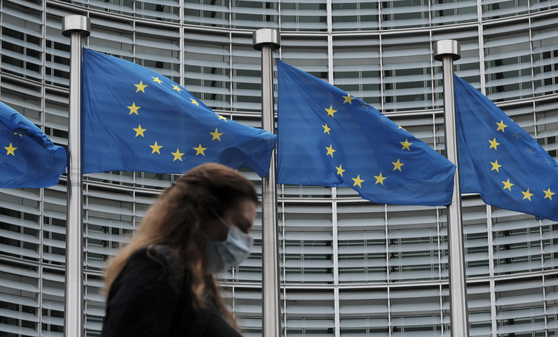
It is predicted that the spread of the new coronavirus infection (Corona 19) will intensify the conflict between EU member states. EPA=Yonhap News
It is predicted that the spread of the novel coronavirus infection (Corona 19) will intensify the conflict between the eurozone (19 countries using euros). As the shock of Corona 19 widens the economic gap between countries. It uses a single currency, the euro, but it is due to differences in industrial structure, economic power, and medical infrastructure by country.
This is the content of’The Current Status and Implications of the Economic Power Gap in the Euro Region After Corona 19′ published in the’Overseas Economic Focus’ published by the Bank of Korea on the 10th. It also contained a warning that the spread of Corona 19 could cause the dissatisfaction between member states to spread into a large conflict as the economic gap between South and Northern Europe is widening beyond the current level.
Corona shock…tourism-oriented Southern Europe’direct hit’

Pope Francis (far left) is walking to the Basilica of Santa Marcello al Coroso in Rome, Italy to pray for the end of the novel coronavirus infection (Corona 19) and recovery of the infected on the 15th (local time). AP=Yonhap News
There is a deepening difference in economic power among countries that underlies the prospect that the eurozone’s fissure will deepen. Southern European countries, which have weaker economic power than northern European countries, have difficulty responding to Corona 19 due to poor medical personnel and equipment. Intensive measures, such as blockade of movement, are being implemented, which are acting as a direct hit on the economy.
In Italy and Spain in April and November last year, when Corona 19 spread on a massive scale in Europe, measures such as movement restrictions were taken. On the other hand, at the same time, Germany effectively suppressed the spread of Corona 19 without any other containment measures.

According to the’Overseas Economic Focus’ released by the Bank of Korea on the 10th, southern Europe, which has a relatively poor medical infrastructure and relatively low economic power than northern Europe, tended to have a lot of intensive COVID-19 quarantine measures, such as blocking movement. Overseas Economy Focus Capture
Germany was able to catch the’two rabbits’ of COVID-19 quarantine and economic activity thanks to the high level of medical infrastructure. According to a survey by the Organization for Economic Cooperation and Development (OECD), the number of treatment beds for severely ill patients in Germany is 33.9 per 100,000 people, far more than Italy (8.9) and Spain (9.7). Thanks to this, unlike some southern European countries, it was possible to minimize the contraction of economic activity by delaying the movement blockade.
It is due to the difference in industrial structure that southern European countries, as well as medical infrastructure, are more exposed to the impact of Corona 19. Unlike northern Europe, which is mainly focused on manufacturing, southern Europe has a strong tendency to rely on service industries such as food, lodging, and travel, which have many face-to-face contact.
According to the report, as of 2019, southern European countries such as Greece (20.8%), Spain (14.3%) and Italy (13.0%) were significantly higher than northern European countries such as Germany (9.1%). This means that in the case of Corona 19, where face-to-face activities were restricted, it was forced to suffer more economic damage.
What is the Eurozone… the name and cancer of a single currency

The eurozone was introduced in 1999 to close the economic gap between member states, but it is currently going against the intention. AP = Yonhap News
The gap between the rich and poor in the EU, deepened by Corona 19, is not new. The European Central Bank (ECB) takes over the role of the central bank, and the inability to implement monetary policy according to the country’s industrial structure and economic power has resulted in widening the economic gap within the eurozone. The result was the opposite of the expectation that monetary integration would increase investment among member states and free labor movement.
The Bank of Korea said, “After the European fiscal crisis, high levels of sovereign debt continue in southern European countries and there is insufficient financial capacity to absorb the shock of Corona 19.” As the unemployment rate rose sharply due to the fall, the gap with Northern Europe widened.”
“The economic gap deepens, but the single currency remains”
The Bank of Korea predicted that the widening economic gap was not a factor that would lead to the collapse of the single currency system. It is judged that the historical background and political significance of the establishment of the euro system cannot be ignored. However, it is expected that the EU-level countermeasures are urgently needed as conflicts between countries showing economic disparities are accumulating.
The BOK analyzed that “after Corona 19, economic dependence on Northern Europe of southern Europe intensified, leading to economic and political conflicts. It will take a lot of effort and time to resolve conflicts of interests between countries and move toward full economic integration.” .
Reporter Yoon Sang-eon [email protected]
